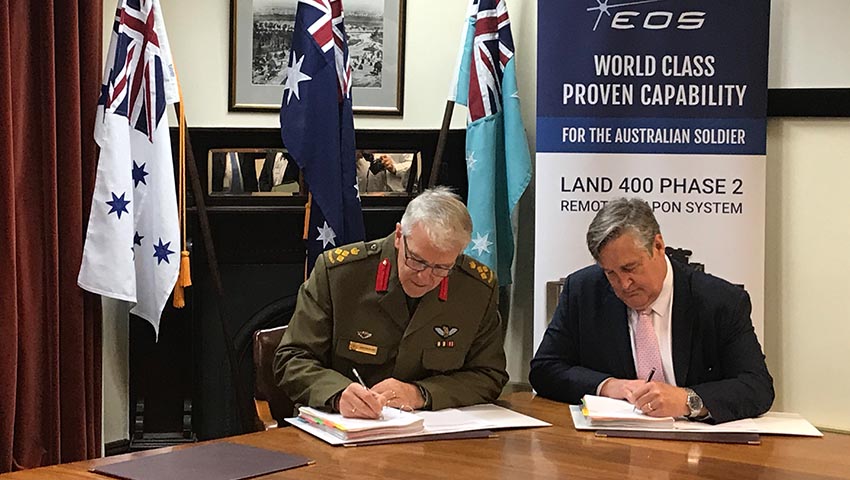The Department of Defence and Canberra-based EOS Defence Systems have signed a $49 million contract to supply remote weapon systems for the Army’s $5.2 billion LAND 400 Phase 2 program.
To continue reading the rest of this article, please log in.
Create free account to get unlimited news articles and more!
The contract, valued at $49 million for the supply of remote weapon systems (RWS) to the LAND 400 Phase 2 Combat Reconnaissance Vehicle project was previously announced on 24 August 2018.
The contract signature marks the commencement of the formal contract. EOS will provide extensive development, integration and testing activities on the Boxer combat reconnaissance vehicle (CRV) followed by the delivery of 82 R400S-MK2-D-HD remote weapon systems commencing in 2022.
Grant Sanderson, CEO of EOS Defence Systems, welcomed the contract signing, "EOS Defence Systems is very pleased to be able to support the ADF with this important capability."
The R400S-Mk2-D-HD RWS is the latest high precision product from EOS Defence Systems and is capable of mounting a variety of weapons from small calibre machine guns through to lightweight cannons and anti-tank guided missiles.
"The R400 is world-class Australian technology supported by over 70 Australian supply chain providers and is an excellent demonstration of Australian defence industry capability supporting Australia’s soldiers," Sanderson added.
The Mk2 operates a variety of weapons including a machine gun, a 30mm lightweight cannon and an automatic grenade launcher.
The first round hit probability is provided through an enhanced integrated ballistic solution that analyses weapon and ammunition data, range and ambient environment in addition to vehicle attitude and dynamics. Performance can be further enhanced with optional video track of targets and multi-axis stabilisation.
The advanced technology of the system combined with the lightweight 30mm ATK M230 LF cannon provides light vehicles with unprecedented access to firepower normally reserved for much heavier (armoured) vehicles.
The R400S-Mk2 is in service with the Australian Army and five other customers.
Combined with the current 230+ EOS remote weapon systems in service with the Australian Army, this latest acquisition creates a fleet across multiple vehicles and delivers improvements in capability, operational effectiveness, training and cost of ownership.
All EOS systems for LAND 400 Phase 2 will be built in Australia in Queanbeyan, NSW, and Hume, ACT, and utilise components from its chain of 70+ Australian suppliers.
Over 88 per cent of EOS’ supply chain is sourced locally. In 2019, the company is set to contribute over $64 million to local suppliers, and this will grow significantly over the coming years.
The $5.2 billion LAND 400 Phase 2 program will have Rheinmetall deliver 211 8x8 Boxer CRVs to the Australian Army.
Under the company's offering to the Commonwealth, Rheinmetall will build a majority of the vehicles at the company's specialised Military Vehicle Centre of Excellence (MILVEHCOE) in Queensland.
The first 25 vehicles will be built in Germany as part of the technology transfer process, with the remaining vehicles to be built in Australia. Boxer will replace the ageing ASLAV vehicles that have served with the Australian Army in East Timor, Afghanistan and Iraq.
The Army will accept 133 reconnaissance variants of the Boxer, which will be equipped with Rheinmetall’s cutting-edge Lance 30mm automatic cannon turret system, among a number of other variants.
Joint venture partners Varley Rafael will supply the Spike LR2 anti-tank guided missile (ATGM) system for the Boxer CRV. The Spike LR2 is a fifth-generation ATGM system, originally developed as a fire-and-forget system. The vehicle-mounted extended-range variant has a range of eight kilometres, while the non-line-of-sight variant can hit targets up to 25 kilometres away.
The Boxer CRV will support Australian industry, sourcing specialised armoured steel from Australian steel companies BlueScope Steel and Bisalloy, with engineering support provided by Melbourne-based Supacat Asia-Pacific.

 Login
Login







